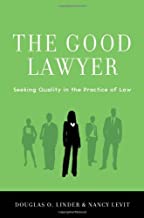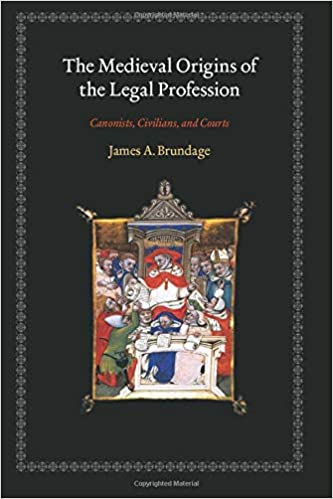Douglas O. Linder & Nancy Levit. THE GOOD LAWYER: Seeking Quality in the Practice of Law. Oxford University Press, 2014, with an enormous bibliography to be found in the footnotes. My exposition, commentary, and critique will be presented in several parts. This one is on background and foundations.
Part I
This part pertains to foundations, topics, and most important sources. Other parts concern other specific matters and will be organized by questions about, commentaries on, and therefore arguments with different chapters.
Part II, already published, is about Chapter One of the book, and that chapter was about the good lawyer, empathy
and the good lawyers’ being empathetic.
Part III, is about Chapter Two, and it is about courage, being courageous, and being a good lawyer.
“No really lazy person can be a good lawyer.”
—MSQ
Part IV, this one, is about willpower, and it is closely connected to Part III by reason of the fact that courage and willpower go together naturally. (Of course, willpower is connected to everything lawyers do, for no consistently good lawyer can be lazy and weak when it comes to devotion to get the relevant work done, even the authors do not actually say this.
One of the central theses of Chapter 3, “The Good Lawyer Has Ample Willpower,” is the crucial importance of persistence of two forms of willpower: the I will [do it] power & the I won’t power.
Unsurprisingly, the authors focus substantially more on the “I will” than they do on the “I won’t,” although they say a little bit about resisting temptations, such as alcoholism. (Do they actually think that an alcoholic cannot be a good lawyer? Really?) Either way—“will to,”/”will toward”/”really-leaning-into” or “will against,”/”will away from”/”leaning against the headwind, as one might put it—could be characterized, as the authors do, as creating a “habit of goal achievement.” (I have long put it this way: “Habit is created by willful repetition.”)
It involves self-discipline, what might be called overcoming the wandering mind and thereby extinguishing “monkey mindedness,” as some have called it, limited goals, and the avoidance of perfectionism (Examples: Enough is enough; Near best is often good enough; Nearly losing is often OK; Acknowledging that closes losses are the best that one could do.) In addition,
persistence requires having the right “mindset,” and it must involve growth. Self-knowledge is needed, as—in some ways, the most
interesting optimism.
The authors adopt the concept of mindset from a book of that title, MINDSET, published by the De Capo Press in 1989. The author, Ellen J. Langer, Ph.D. is an award-winning, extensively published psychologist on the faculty at Harvard, and—of course—that means that she is wise, wise, wise. Besides, three pages of known high-prestige professionals endorse the book in its first pages; one of them is Alan Dershowitz, and the authors would probably nominate him to be a good lawyer.
Persistence for lawyers is especially important for the relationship virtues, empathy, courage, tolerance, realism, etc., but it is also important for simple mental activity, since lawyering is a “particularly mentally, demanding activity. But, the authors point out, that lawyerly business of mind, all other professions involving making “decisions requiring conscious and sustained thought,” and “mental busyness has its costs.”
I especially both love and hate this chapter. I love it because the ideas are encouraging. Then again, I have a tendency to like
self-improvement books, if they are not too “Seven Steps to. . . .”-trash. I love the chapter since much of it seems right as well as right on. I love this chapter because it is really about things that lawyers need.
I hate this chapter because it makes me feel inadequate and absent from the fleet of really good lawyers and that leads to shame resulting from what I could have done and from false self-presentation. I am only erratically persistent; I cannot completely avoid perfectionism, even in judging others; and I am less than optimistic. In fact, my wife, also a lawyer, thinks I am pessimistic. I have to grant her a degree of that truth since I conceive myself as only being partially pessimistic, and I believe that rational realism requires a fair degree of pessimism, but she denies this based on theological reasons, deep faith, and a greater devotion of religious spirituality. (Of course, any good lawyer can have that, though I think the authors give no hint that either it or its opposite would, for any reason, be highly correlated with being a good lawyer.)
In addition, I am not sure I have the right mindset and I am money-minded with a vengeance. I can testify that it is very distracting and tends to build all sorts of negative characteristics, including distractedness, a sense of mental inadequacy, stress, and anxiety, among others.
Nevertheless, I must wonder a question, even in the context of what I love about this chapter. Is it really true that all decisions require study in order to make those decisions? In a situation like trying a case, a number of decisions must be made
instantly, or close to it. Whether to object to a question is one of them. Whether to ask certain questions is another? The tactic of whether to lead a witness may be made in advance and involve thought; on the other hand, some do not.
The authors probably already believe this and see it treated in their account of intuition discussed in the next chapter. That is certainly true. Sound instantaneous decisions usually arise from experience and tend to entail that there has been reasoning about related matters, and it emphasized the importance of intuition. In other words, it emphasizes both “dual reasoning”
and “duel reasoning.






Recent Comments